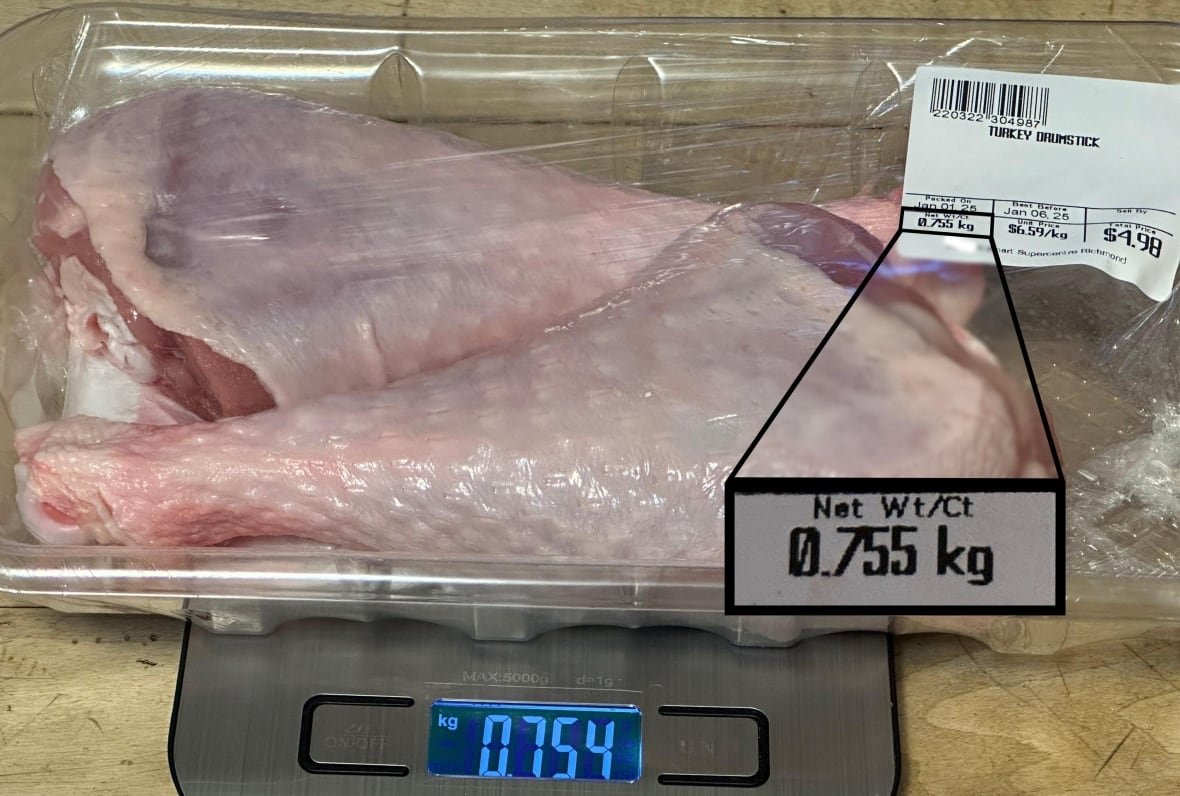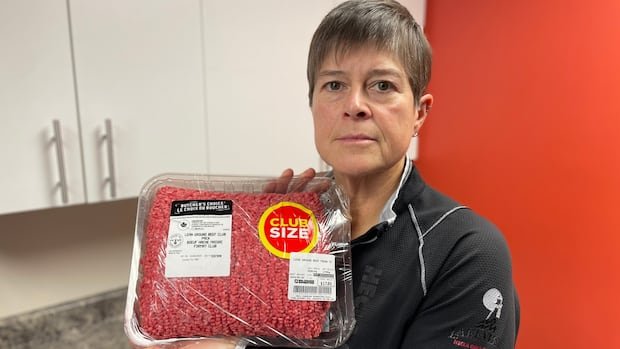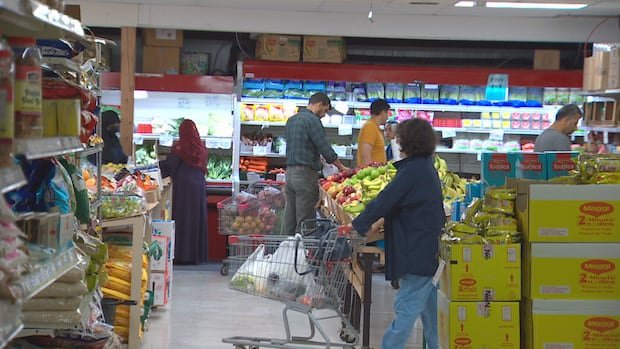The Loblaw grocery chain overcharged customers by selling underweighted meat across 80 stores for an undisclosed period that ended in December 2023, a CBC News investigation has found.
On top of that, over the past few months, CBC News visited seven major grocery stores in three different provinces and discovered packages of underweighted meat in four of them: two Loblaw stores and one Sobeys-owned location, plus a Walmart. Calculated overcharges per item ranged from four to 11 per cent.
The findings suggest grocers selling underweighted meat is a prevalent and ongoing problem, at a time when shoppers are struggling with high food prices that began rising during the COVID-19 pandemic.
“When you’re seeing that they’re not weighing meat product properly … there’s an extra hit there that the consumer is taking,” said Iris Griffin, a shopper who blew the whistle on the 80-store Loblaw case.
In late November 2023, Griffin, who lives on Hecla Island in Manitoba’s Lake Winnipeg, bought a package of ground beef at a Loblaw-owned Superstore in Winnipeg.
The beef’s label stated that its net weight was 1.834 kilograms. But when Griffin weighed the meat in order to freeze equal portions, she said it turned out to be 1.7 kg — 134 grams short.
She said the weight of the beef’s hard plastic tray made up for the missing weight, so she figures the meat had been incorrectly weighed with the packaging.
“I was angry,” said Griffin, who calculated she’d been overcharged $1.27 (7.9 per cent) on the $17.35 price tag. “I’m being charged for this piece of plastic at the price of the ground beef.”
Under federal regulations, posted net weights for packaged food — and prices based on that weight — can’t include the packaging.
Worried the problem could be widespread, Griffin complained to the federal food regulator, the Canadian Food Inspection Agency (CFIA), which alerted Loblaw.
Loblaw apologizes
Loblaw Companies Ltd. spokesperson Catherine Thomas said in an email that due to an error involving a change in packaging, the grocer sold “a small number” of underweighted meat products in 80 stores across Western Canada.
She didn’t address questions about when the problem started and how much customers were overcharged.
“We have robust internal processes and controls in place; however, they are subject to the occasional operational error,” Thomas said. “Even though 97 per cent of our [2,400] stores were unaffected, any pricing issue that results in an overcharge is one too many.”
The CFIA said it didn’t visit any Loblaw stores during its investigation into the matter or issue any fines because the grocer reported it had fixed the problem.
In late 2024, almost one year after the CFIA closed the case, CBC News found packages of underweighted chicken at a Loblaws store in Toronto, and underweighted chicken, pork and ground beef at a Loblaw-owned No Frills in Calgary. It appeared the items had been weighed with the packaging.
CBC News purchased six items from the two stores and calculated a total overcharge of $5.14 — five per cent on the $107.43 bill.

Thomas said that Loblaw conducted a review and “identified [weight] inconsistencies similar to those that the CBC found.” She said the problem “did not impact the vast majority” of Loblaw’s stores and has been fixed.
“We apologize for these errors,” Thomas said, adding that the grocer has “refreshed our in-store training.”
Several packages of underweighted pork, chicken and beef were also found by CBC News at a Sobeys-owned FreshCo in Toronto in late 2024, and at a Walmart in Richmond, B.C. last week. It appeared the products at both stores had been weighed with the packaging.
CBC News bought six items from each store and calculated a total overcharge of $2.62 (seven per cent) on the $38.08 FreshCo bill, and an overcharge of $3.07 (6.9 per cent) on the $47.42 Walmart bill.

Walmart and Sobeys Inc. each offered few details, stating only that they were addressing the matter with third-party partners who weighed the meat products in the stores.
“We take concerns of this nature very seriously,” Walmart spokesperson Felicia Fefer said in an email.
Sobeys stores adhere to federal weight regulations and “expect the same compliance from our third-party agents,” company Sobeys spokesperson Tshani Jaja said.

Lawyer and consumer advocate Daniel Tsai said even a small weight discrepancy could amount to big profits for grocers over time.
“That’s going to add up into a very large number, potentially into millions and millions of dollars,” he said. “There’s definitely a need here for some kind of rectification that consumers get compensated.”
When asked, Thomas said Loblaw will compensate impacted customers. Walmart and Sobeys didn’t respond.
How long has this been going on?
CBC’s findings are no surprise to Terri Lee, who worked as a CFIA inspector for 24 years until her retirement in 2021.
She said that when on the job, she consistently found that grocers were selling underweighted meat and seafood, often caused by stores not properly subtracting the packaging weight from the total weight of the product.
“There was a whole myriad of excuses,” Lee said. ‘”The regular person was on holidays, it was the weekend help.’ … The store would blame the head office and the head office might blame the store.”

She said grocers need to better monitor their weighing systems, and the CFIA needs to do more in-store inspections.
“The cost of food has really increased,” Lee said. “It’s extremely important now to protect the consumer.”
CFIA spokesperson Patrick Girard said in an email that the agency “works every day to protect consumers” from mislabelled food by doing inspections, surveillance, responding to complaints and raising awareness.
In the 2023-24 fiscal year, the CFIA conducted 125 planned inspections for food weight accuracy among Canada’s more than 8,000 grocery stores, according to the agency.
What about fines?
CBC News uncovered documents detailing 11 other CFIA investigations between 2019 and 2023, where individual food stores weren’t properly subtracting the weight of the packaging for one or more meat or seafood products.
The agency said that in each case, the errors had been fixed and no fines issued.
Included in the documents was a Calgary store — name redacted — where a CFIA inspector warned it three times over a 17-day period in 2019 to stop including the packaging when weighing various halal meats. In that case, the business got a violation notice that included a warning.
“There’s no bite to the enforcement,” said Mark Olivier, who worked for more than 20 years in the grocery industry, including 10 in store management.
Olivier complained to the CFIA — once in 2020 about underweighted lamb, and again in 2022 about two different underweighted hams he bought at Food Basics in his hometown of Sault Ste. Marie, Ont. The chain is owned by grocer Metro Inc.
The CFIA said that in both cases, Food Basics had weighed the meat with its plastic wrapping and immediately corrected the errors, so no fines were issued.
A new report released by experts at four Canadian universities is predicting food prices will continue to outpace Canada’s target inflation rate of two per cent in the new year.
But Olivier said unless retailers face repercussions, the problem of misweighing meat is likely to continue. “What’s the motivation for the store to do things properly if they’re more profitable when they err to the detriment of the consumer?”
CFIA spokesperson Girard said the agency issues fines when appropriate.
“Industry does face repercussions, and they are proportionate to the food safety risk and the seriousness of the non-compliance.”
Loblaw customer Griffin said Canadians need to keep an eye out for misweighed meat and to alert the CFIA if they encounter it.
“People need to be angry,” she said. “If this has been going on for as long as we think it has been, there’s a whole lot of money that’s come out of the pocket of [shoppers].”


